
Drop by booth 4942 or
attend our workshop
At AUVSI XPONENTIAL 2023, we are featuring our leading-edge adaptive and collaborative autonomy products in the maritime, ground, air, and space domains. Attend our speaker sessions and workshops to learn how we’re building the blueprint for future autonomous systems.
Autonomy you can trust
Charles River Analytics is a pioneer in autonomy-enabling technologies, leveraging our 40-year history in advanced AI/ML R&D to develop today’s leading-edge adaptive and collaborative autonomy products and prototypes. Whether you’re an end user or an industry partner, come talk to us about your most challenging needs!
Our leading-edge collaborative and adaptive autonomy technologies turn uncrewed vehicles into trusted members of your human-machine team on the ground, at sea, in the air, and in space.
Our scientists and engineers combine their expertise in explainable AI, machine learning, neural networks, and computer vision to build a unified framework for future autonomous systems.
True, trusted autonomous systems require solving a multitude of interrelated problems. So we’ve built our expertise from the ground up, developing proof-of-concept demonstrations, highly capable prototypes, and innovative products for a wide range of autonomous applications.
We push the limits of autonomy by developing solutions that work in unpredictable, low-bandwidth environments. We transform human-in-the-loop systems to on-the-loop control and move single vehicle operations to heterogeneous swarms that can act and reason faster than intuition.
We integrate this diverse work into a unified autonomy framework guided by a simple idea:
True autonomy will only be adopted when it can earn our trust.

Perceiving what’s out there
Situational awareness
Getting there
Autonomous, adaptive navigation
With our onboard AI, an autonomous harbor vessel adapts its course and behaviors in response to its environment and potential threats to safely complete its mission. Behaviors are based on COLREGs and an in-depth analysis of expert harbor pilot decision making. In one test, integrating our autonomous behavior code shortened routes, increased standoff, and reduced near misses to zero.
Our dynamic routing and autonomous path planning, coupled with 3D perception and image-processing algorithms, power autonomous vehicle teams to navigate treacherous and cluttered environments to detect and classify marine life, navigate disaster areas, and localize nuclear threats in public spaces.
Our other capabilities can turn any kayak into an autonomous vehicle, allow a vehicle to self-geolocate, modify routes based on damage or fuel status, and navigate thermoclines to avoid comms disruptions.
Adapting to changes in the environment
Adaptive autonomy
Our onboard AI uses sensors and models to adapt tactics to ensure mission completion. Machine learning and probabilistic modeling make any software adaptable—allowing it to understand, learn, and adapt to changes in the environment and in the health and status of the uncrewed vehicle.
We use a bio-inspired approach to large swarm control, with deep learning so the swarm can discover and learn the most effective tactics for urban and other complex settings.
Collaborating and communicating with the team
Collaborative autonomy
We use probabilistic causal modeling techniques that generate simple explanations of how complex, deep learning machines work, helping humans develop trust in autonomy.
Our gesture and natural language mixed-reality interface provides a natural feel to directing air and ground robot teams.
With our collaborative and adaptive autonomous swarm software, teams of robots can remove the injured from harm, classify marine life, and explore the moon, dividing tasks amongst themselves while anticipating and working around damage encountered by their robotic teammates.

We are proud to be part of the AUVSI community. AUVSI is the world’s largest nonprofit organization dedicated to the advancement of uncrewed systems, robotics, and autonomy.
Meet the team!
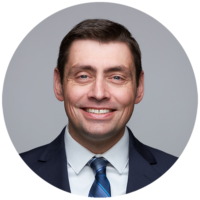
Ross Eaton
Principal Scientist and Director of Marine Systems
Ross Eaton
Principal Scientist and Director of Marine Systems
Ross S. Eaton is a Principal Scientist and Director of Marine Systems in the Sensing, Perception, and Applied Robotics division at Charles River Analytics, an R&D company. He leads the development, demonstration, and marketing of Awarion™, Charles River’s autonomous maritime lookout system. Ross has nearly 20 years of experience, including ship detection and classification that support COLREGS compliance on uncrewed surface vessels, surface situational awareness, and multi-modal whale detection. In addition, his research spans into several areas of computer vision, including hardware-accelerated object detection and tracking, GPS-denied localization, and automatic image quality assessment and enhancement.
Ross Eaton will be leading the workshop:
The Design Dream, the Operational Nightmare: How to Ensure that Autonomy Designers’ Efforts Deliver on Operators’ Dreams
5.09.2023 | 11:00–12:30 pm
He will also be in the panel discussion:
Achieving the Blueprint for Autonomy: The Way Forward from a Trusted Source
5.09.2023 | 4:00–4:45 pm

David Koelle
Director of Engineering and
Principal Software Engineer
David Koelle
Director of Engineering and Principal Software Engineer
David Koelle is Director of Engineering and Principal Software Engineer at Charles River Analytics, an R&D company. His work on multi-agent robotic systems focuses on coordinating decentralized, heterogeneous, and autonomous platforms to achieve mission objectives even in the face of degraded communications or performance. Dave has over 27 years of experience in AI, complex systems, operator trust in analysis systems, and usability engineering. Before joining Charles River Analytics, Dave developed software for business intelligence, pioneered a decentralized system for managing resilience for a next-generation network operating system, and developed controller displays for international air traffic control systems.
David Koelle will be presenting:
A Staged Blueprint for Realizing Collaborative Autonomy
5.09.2023 | 2:00–2:25 pm

Dr. Arjuna Balasuriya
Marine Robotics
Senior Scientist
Dr. Arjuna Balasuriya
Director of Engineering and Principal Software Engineer
Dr. Arjuna Balasuriya is a Senior Scientist in the Sensing, Perception, and Applied Robotics division at Charles River Analytics, an R&D company. He builds autonomous systems that transform research ideas into practical, usable products used by specialists in their field. Arjuna led Charles River’s development, in partnership with Teledyne Gavia, of AutoTRap Onboard®, a commercial product that applies recent advances in deep learning object detection to locate and classify objects in sonar data. Arjuna has 25 years of experience in the field of marine robotics and conducts research to develop uncrewed, untethered, autonomous mobile undersea vehicle systems that navigate and adapt to changing environmental conditions. Before joining Charles River, Arjuna led the Ocean Observatories Initiative at MIT’s Laboratory for Autonomous Marine Sensing Systems. He has published more than 100 journal and conference papers on sensing and automation and is a senior member of the IEEE and chair of the IEEE OES Information Processing and Data Fusion technical committee.
Dr. Arjuna Balasuriya will be presenting:
Challenges and Progress in Behavior-Based Adaptive Autonomy
5.09.2023 | 2:30–2:55 pm
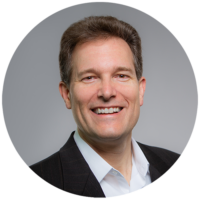
Rich Wronski
Division Vice President
and Principal Scientist
Rich Wronski
Division Vice President and Principal Scientist
Rich Wronski, Division Vice President and Principal Scientist, leads Charles River Analytics’ Sensing, Perception, and Applied Robotics division. He manages an extensive autonomous robotics portfolio, leveraging machine learning-based computer vision, sensor fusion, automated object/target recognition and tracking, multi-sensor-based navigation, collaborative autonomy and swarms, and electromechanical engineering for harsh environments. For over 30 years, Rich has focused on accelerating fundamental research through innovative products that meet the needs of his customers across the land, sea, air, and space domains. Before joining Charles River, he served as Director of Custom Products at American Science and Engineering, where he led the development of innovative X-ray based detection systems combating terrorism and trade fraud. Rich speaks regularly on the topic of autonomy, recently joining AUVSI President Brian Wynne’s 2023 Future Forecast webinar as the panel’s technology expert.
Rich Wronski will be leading the panel discussion:
Achieving the Blueprint for Autonomy: The Way Forward from a Trusted Source
5.09.2023 | 4:00–4:45 pm
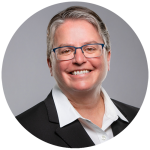
Karen A. Harper
Senior Principal Scientist and President of
Charles River Analytics
Karen A. Harper
President and Senior Principal Scientist
Karen A. Harper is President and Senior Principal Scientist at Charles River Analytics, an R&D company bringing foundational research to life through intelligent systems. Karen provides strategic direction for government services and commercial solutions and oversees Charles River’s significant IP portfolio. Karen has over 25 years of experience leading various programs focused on autonomy development for uncrewed systems, including real-time sensor processing enabling autonomous situation awareness and decision-making, real-time control systems in maritime robotics applications, and human-centered remote supervisory command & control (C2) solutions. Her expertise also spans the simulation of human behavior, at both the individual and organizational levels, and the development of advanced human-computer interfaces (HCIs) for complex C2 systems. Karen is a member of the Small Business Technology Council Board and the New England Innovation Alliance.
Karen Harper will be at our booth 4942.

Daniel W. Stouch
Principal Scientist and Director of Space and Airborne Systems
Daniel W. Stouch
Director of Space and Airborne Systems
Dan Stouch is a Principal Scientist and the Director of Space and Airborne Systems at Charles River Analytics, an R&D company. For over 25 years, Dan has successfully led many large R&D efforts for customers such as NASA, NOAA, DHS, and various DoD agencies. His work includes an autonomous robotic prototype designed to detect pinnipeds, the group of animals that includes walruses and seals. As part of DARPA’s Hallmark program, he led the development of an XR application for space situational awareness (SSA) and a tool that fuses SSA data in a probabilistic model to analyze potential threats in space. He has completed Squadron Officer’s School, Air Command and Staff College, and Air War College from Air University, and is a member of ACM, AUVSI, MORS, and PMI.
Dan Stouch will be in the panel discussion:
Achieving the Blueprint for Autonomy: The Way Forward from a Trusted Source
5.09.2023 | 4:00–4:45 pm
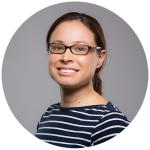
Stephanie Kane
Principal Scientist and Director of UX Innovations
Stephanie Kane
Principal Scientist and Director of UX Innovations
Stephanie Kane is Principal Scientist and Director in the UX Innovations division at Charles River Analytics, an R&D company. Stephanie is a leading researcher of cutting edge user interface and interaction design approaches across a broad range of commercial, government, and educational applications. For over 15 years, she has managed projects over a wide range of technical disciplines for customers such as the Air Force, Navy, Army, and DARPA. Stephanie’s research is focused on the effective design, development, and evaluation of novel user interfaces. She has extensive experience designing and evaluating screen, mobile, tablet, touch, gesture, auditory, voice, and augmented-reality-based interaction methods.
Stephanie Kane will be in the panel discussion:
Achieving the Blueprint for Autonomy: The Way Forward from a Trusted Source
5.09.2023 | 4:00–4:45 pm
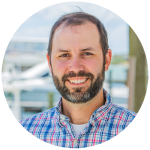
James Everson
Marine Operations
Manager and Engineer
James “Jay” Everson
Marine Operations Supervisor and Engineer
James “Jay” Everson is the Marine Operations Manager at Charles River Analytics, an R&D company. Jay has over 15 years of experience in the commercial marine industry, including complex marine operations, nautical sciences, and marine systems. He has vast knowledge of controlling complex engine, propulsion, and positioning systems, as well as maintaining mission-critical streamlined maintenance systems that are required in some of the most strictly regulated and safety-conscious industries in existence. At Charles River, Jay manages marine assets and operations and contributes his regulatory awareness and extensive offshore experience to position Charles River as a leader in marine solutions. Jay is a Chief Mate Unlimited Licensed Mariner with over 10 years seagoing experience in leadership roles aboard advanced vessels such as ultra-deep water offshore drilling, supply, and inspection.
Jay Everson will be a presenter in the workshop:
The Design Dream, the Operational Nightmare: How to Ensure that Autonomy Designers’ Efforts Deliver on Operators’ Dreams
5.09.2023 | 11:00–12:30 pm

Dr. Madison Clark-Turner
Scientist in Sensing, Perception,
and Applied Robotics
Dr. Madison Clark-Turner
Scientist in the Sensing, Perception,and Applied
Robotics division
Dr. Madison Clark-Turner is a Scientist at Charles River Analytics, an R&D company, in the Sensing, Perception, and Applied Robotics division. He has extensive experience developing deep learning architectures to address the challenges robotic domains face in applications across computer vision, signal processing, and natural language processing (NLP). Madison’s projects have focused on improving and utilizing NLP for the command and control of teams of heterogenous robots and for the detection, classification, and segmentation of marine mammals and post-natural disaster features from drone imagery.
Dr. Madison Clark-Turner will be in the panel discussion:
Achieving the Blueprint for Autonomy: The Way Forward from a Trusted Source
5.09.2023 | 4:00–4:45 pm

Jacob Riedel
Software Engineer in Sensing, Perception,
and Applied Robotics
Jacob Riedel
Software Engineer in Sensing, Perception,
and Applied Robotics
Jacob Riedel is an Electrical and Computer Engineer at Charles River Analytics, an R&D company. Jacob develops full-stack software for deployment on complex autonomous systems, including uncrewed robotics platforms, sensor platforms for aircraft, and command and control systems for operators. Jacob is the integration lead for of Awarion™, Charles River’s autonomous maritime lookout system. His expertise includes over-air laser communications and traffic detection using computer vision.
The Design Dream, the Operational Nightmare: How to Ensure that Autonomy Designers’ Efforts Deliver on Operators’ Dreams
5.09.2023 | 11:00–12:30 pm
